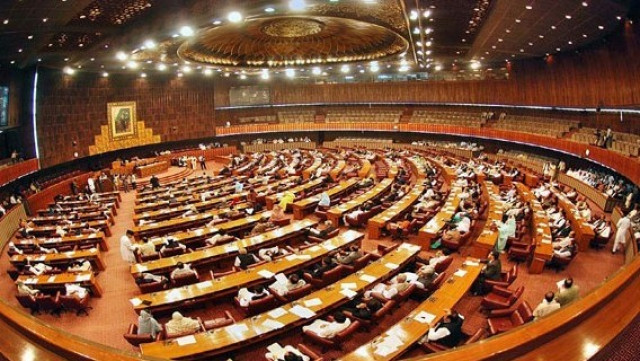Government spends Rs370b without parliament’s approval
For the first time the government has spent about Rs370 billion without the consent of parliament.

According to official documents, during financial year 2009-10 the government made additional expenditures of Rs369.7 billion, which were not among budget allocations, under various heads. The authorities will now “request” parliament to give approval to the spending in the last week of June.
“It is an unprecedented supplementary grant in the history of the country, which poses a question mark over financial management by the government,” said former finance minister Senator Ishaq Dar.
He said the government should put a cap on supplementary grants and these should only be provided after a mid-year budgetary review in December.
The Public Accounts Committee has also time and again asked the government to put its house in order.
Special Secretary Finance Asif Bajwa said from the next fiscal any supplementary grant exceeding 10 per cent of the total allocated budget would go to the cabinet for approval.
For this year, the government had estimated current expenditures of Rs1.7 trillion but after taking into account the supplementary grants the non-development spending would end up near Rs2.1 trillion.
Official documents showed that over 55 per cent of the extra grants went to meet contingent liabilities on account of the war on terror and various subsidies.
For subsidies and miscellaneous expenditures, the government had set aside Rs274 billion, but documents showed that by the end of the year expenses soared to Rs480 billion, including a supplementary grant of Rs206.2 billion.
Over half of this amount was spent to meet contingent liabilities. On top of that, there was an increase of Rs35 billion in the defence budget, which was also a supplementary grant.
During the year, the government gave a supplementary grant of Rs69 billion to the Pakistan Electric Power Company for covering power subsidy. Besides, Rs23 billion were paid to the Karachi Electric Supply Company on account of power subsidy for the citizens of Karachi.
The Finance Division gave a supplementary grant of Rs2.3 billion for paying mark-up on Term Finance Certificates (TFCs), issued to retire circular debt. For the Benazir Stock Option scheme, a supplementary grant of Rs116.5 million was given to the Privatisation Commission.
The Finance Division also utilised Rs30 billion in addition to the allocated budget to settle arears of provinces. The government paid Rs10 billion to Khyber-Pakhtunkhwa on account of net hydel profit and the amount was not budgeted.
The Centre paid Rs13 billion to Punjab as arrears of net hydel profit of the Ghazi Barotha Hydropower project. Besides, a supplementary grant of Rs5.4 billion was released to Punjab for land transfer to the Pakistan Telecommunication Company.
Another supplementary grant was released to the Pakistan Agriculture Storage and Supplies Corporation for paying Rs8 billion to Punjab for maintaining wheat strategic reserves of two million tons.
The government paid Rs850 million to the Fata Secretariat to raise local Laskhars (tribal force) aimed at fighting the militants, but the money was not allocated by parliament.
A supplementary grant of Rs1 billion was released for the Higher Education Commission to cover the study cost of children of the Internally Displaced Persons.
The Press Information Department got Rs1.4 billion supplementary grant to pay for the losses of PTV and clear Rs250 million spent on a media campaign on counter-terrorism.
The government also paid Rs10 billion in supplementary grant to Khyber-Pakhtunkhwa to maintain law and order.
The Prime Minister’s Secretariat utilised Rs12.5 billion on parliamentarians’ development schemes without the approval of parliament.
For servicing domestic debt, the government released a supplementary grant of Rs19 billion, of which Rs18.2 billion was interest cost of government treasury bills.
Published in the Express Tribune, June 13th, 2010.



















COMMENTS
Comments are moderated and generally will be posted if they are on-topic and not abusive.
For more information, please see our Comments FAQ